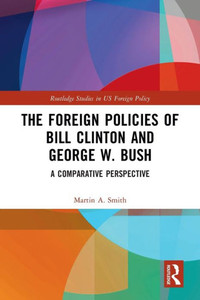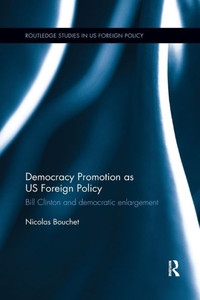
The Foreign Policies Of Bill Clinton And George W. Bush: A Comparative Perspective (Routledge Studies In Us Foreign Policy)
Routledge
ISBN13:
9780415437738
$199.99
This book offers a comparative analysis of the approaches, policies and records of the Clinton administration and the current administration of George W. Bush with regard to key foreign policy issues. The issue areas selected for examination are those that have aroused particular controversy and debate over the recent past. In Part One the three issues identified by the Bush administration in the post -9/11 security environment as being at the heart of a threat 'nexus' will be examined and assessed. Although sometimes forgotten in post-9/11 debates, these same issues also preoccupied the Clinton administration for substantial parts of its term during the 1990s. Chapter One will consider the respective responses to the threats and challenges posed by international terrorism, particularly of the militant Islamic type. Chapter Two will focus on the so-called 'rogue states'; first systematically identified as such during President Clinton's term of office. Chapter Three will round out this section by examining the US response to the actual and potential proliferation of weapons of mass destruction (WMD), most especially by 'rogue' states. In Part Two attention will turn to debates surrounding the nature of US engagement with key regions and states. These debates preceded 9/11 and were prominent during the Clinton years. They have enjoyed continuing currency during the current Bush administration. Chapter Four will examine US policy towards the Middle East since 1993, with a particular focus on the Israel-Palestinian peace process. The analytical agenda for Chapter Five will focus on relations with China and Russia, arguably the two most challenging and important single-state relationships that have confronted US policy-makers since the end of the Cold War. Possibly the best-known of all the debates that have surrounded their respective foreign policies relate to Clinton's alleged predilection for multilateral approaches to international relations and to dealing with security problems (at least during his early years) and the contrast with Bush's supposed hard-edged unilateralism. The two chapters in Part Three will be focused on these issues. Relevant debates will be unpacked and explored via discussion of US policy and attitudes towards the United Nations in Chapter Six and, as a follow-on regional case study, NATO and transatlantic security relations in Chapter Seven. The final substantive section of the book - Part Four - will turn the spotlight onto an area that has been relatively little examined in comparison to those outlined above. This is what is often referred to generically as the 'soft security agenda'. The label is used to cover a broad and disparate set of issues, of which three will be selected for consideration in Chapter Eight, on the grounds that they offer the most significant insights into the respective approaches adopted by the two Administrations under consideration here. The three issues which will be examined in this chapter are: the environment and, in particular, international attempts to tackle global climate change; overseas aid and assistance, particularly with regard to Africa and, finally, the politics of disease, with a particular focus on international efforts to combat the spread of AIDS.
- | Author: Martin A. Smith
- | Publisher: Routledge
- | Publication Date: Sep 19, 2017
- | Number of Pages: 214 pages
- | Language: English
- | Binding: Hardcover
- | ISBN-10: 0415437733
- | ISBN-13: 9780415437738
- Author:
- Martin A. Smith
- Publisher:
- Routledge
- Publication Date:
- Sep 19, 2017
- Number of pages:
- 214 pages
- Language:
- English
- Binding:
- Hardcover
- ISBN-10:
- 0415437733
- ISBN-13:
- 9780415437738





